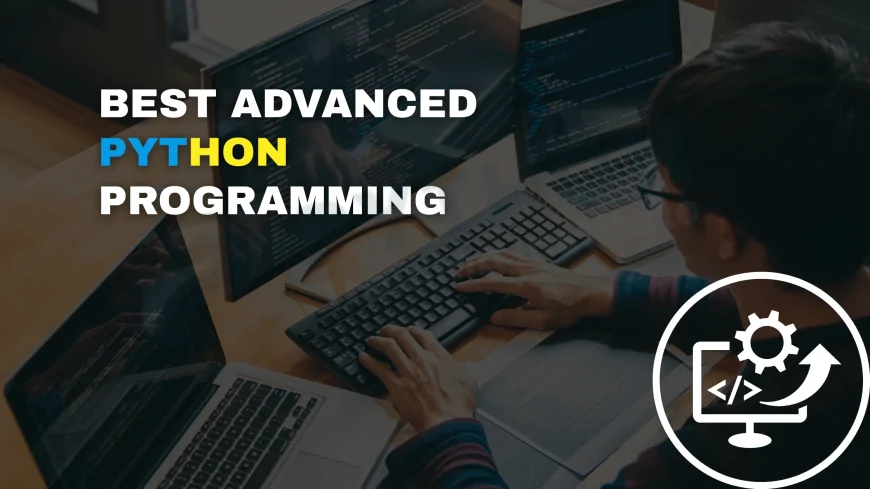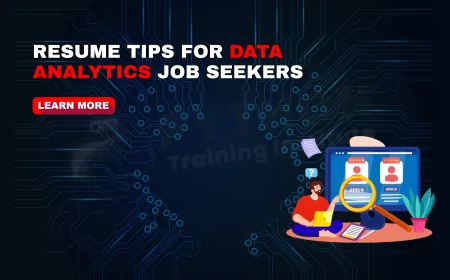Best Advanced Python Programming Courses in Pune | Learn Expert-Level Python
Master expert-level coding with the best advanced Python programming courses in Pune. Learn from top training institutes, build real-world projects, and boost your career in software development, data science, and automation.

Python has evolved from a simple scripting language into one of the most widely used and versatile programming tools in the world. As technology reshapes industries and programming becomes central to solving real-world problems, Python’s influence continues to grow. While many learners begin with basic Python, it’s the advanced-level mastery that distinguishes a competent coder from a proficient developer.
In Pune—a city recognized as one of India’s leading IT and education hubs—there is a growing demand for advanced Python programming courses. These programs equip learners not just with programming syntax but with the ability to build scalable software systems, automate complex tasks, and handle real-world data challenges.
This article explores everything you need to know about advanced Python programming in Pune—what to expect from such courses, key skills taught, target audiences, career impact, curriculum structures, and how to identify high-quality programs.
Why Pune Is a Hotspot for Advanced Python Learners
Over the past decade, Pune has grown into a major hub for IT, software services, and startups. It’s a city with a strong ecosystem for technology professionals—from educational institutions to innovation clusters and corporate tech parks.
Here’s why Pune is ideal for advancing your Python skills:
-
Vibrant Tech Ecosystem: Thousands of tech companies—ranging from MNCs to agile startups—create a strong market for advanced programming professionals.
-
Student-Friendly Culture: Pune is known for its educational atmosphere, with a high concentration of learning communities, co-working spaces, and coding bootcamps.
-
Job Opportunities: The city offers numerous roles in automation, data analysis, software development, and machine learning—most requiring advanced Python expertise.
-
Cost-Effective Learning: Compared to metro cities like Bangalore or Mumbai, Pune offers more affordable yet high-quality learning environments.
What Defines an “Advanced” Python Course?
An advanced Python course isn’t simply a longer version of an introductory course. It goes beyond basic syntax, loops, and data structures. It dives deep into architecture-level thinking, best practices, optimization, and frameworks that professionals use in real-world projects.
Let’s break down what makes a course “advanced”:
| Feature | Description |
|---|---|
| Complex Programming Concepts | Includes decorators, generators, metaclasses, and context managers |
| Object-Oriented Mastery | In-depth implementation of classes, inheritance, mixins, and abstract base classes |
| Functional Programming | Use of lambda functions, map/reduce, closures, and immutability principles |
| Exception Handling at Scale | Managing errors across large systems, logging, and custom exception classes |
| Performance Optimization | Using time/memory profiling tools, asynchronous programming, multiprocessing |
| Testing & Debugging | Test-driven development (TDD), PyTest, coverage reports, debugging techniques |
| Real-World Projects | Enterprise-grade problem-solving, REST APIs, database integration, automation pipelines |
| Frameworks & Tools | Django/Flask, Pandas, NumPy, Celery, SQLAlchemy, FastAPI, PyTorch, etc. |
These advanced topics are often applied in full-scale software systems, making such courses ideal for career transitioners, upskilling professionals, or entrepreneurs building Python-based applications.
Who Should Take an Advanced Python Course?
Not everyone is ready for advanced Python, and that’s okay. These programs are targeted toward learners with a strong grasp of programming basics, looking to apply Python in larger and more complex systems.
Ideal candidates include:
-
Software Developers looking to switch from Java, .NET, or C++ to Python-centric roles.
-
Backend Engineers aiming to build scalable APIs and integrate Python with other technologies.
-
Data Analysts & Scientists who want to move beyond notebooks and into production systems.
-
DevOps Professionals building automation and orchestration tools using Python.
-
AI & Machine Learning Enthusiasts who require deeper understanding of performance, packages, and deployment.
-
Product Developers or Founders seeking to build, test, and scale Python-based applications in-house.
Pre-requisites usually include:
-
Comfort with Python basics: variables, loops, functions, file handling
-
Basic understanding of object-oriented programming
-
Familiarity with using pip, virtual environments, and Git
Core Learning Outcomes of Advanced Python Programs
What should you expect to walk away with after completing an advanced Python course? The outcomes are both technical and strategic.
| Learning Outcome | Description |
|---|---|
| Mastery of Python Internals | Understanding memory management, scopes, closures, GIL, and internals |
| Build Production-Ready Applications | Developing apps that can be deployed, monitored, and scaled |
| Write Testable, Maintainable Code | Using unit tests, linting tools, and adhering to PEP8 |
| Asynchronous Programming | Working with asyncio, coroutines, and concurrent execution |
| Automate Complex Workflows | Automating data pipelines, deployment workflows, or file operations |
| Database Integration | Working with relational (SQL) and NoSQL databases using ORMs |
| Proficient Use of External Libraries | Hands-on experience with advanced Python libraries |
| Real-Time Problem Solving | Tackling real-world scenarios like crawling, scraping, task queues |
Typical Curriculum Structure in an Advanced Python Course
A well-structured course typically spans 40–80 hours and is divided into modular segments. Here's an example curriculum breakdown:
Module 1: Python Internals and Memory Model
-
Namespaces, scopes, and LEGB rule
-
Python object lifecycle
-
Garbage collection and memory optimization
Module 2: Advanced OOP & Design Patterns
-
Abstract classes and interfaces
-
Factory, Singleton, Strategy patterns
-
Composition vs. inheritance
Module 3: Functional Programming in Python
-
Closures, decorators, currying
-
Using
map,filter,reduce -
Immutability and state management
Module 4: Working with Databases
-
SQL with SQLite and PostgreSQL
-
NoSQL with MongoDB
-
Using SQLAlchemy and ORM design
Module 5: Concurrency and Parallelism
-
Threads, multiprocessing
-
AsyncIO and event-driven design
-
Performance benchmarking
Module 6: Testing and Debugging
-
Writing unit and integration tests
-
Code coverage, mocking, patching
-
Debugging tools and techniques
Module 7: Packaging and Deployment
-
Creating and publishing packages
-
Virtual environments,
pipenv,poetry -
Deployment strategies on cloud (overview)
Module 8: Capstone Project
-
End-to-end real-world application
-
Git versioning, documentation, CI/CD simulation
-
Final code review and evaluation
What Makes a Great Advanced Python Program in Pune?
Since we’re not naming institutions, here's how to evaluate a quality advanced Python course:
1. Project-Centric Design
The best programs focus less on lectures and more on hands-on projects that simulate real-world problems. Capstone projects or sprint-style builds are key to learning retention.
2. Mentorship Over Lecturing
Look for environments where instructors serve as mentors, helping you debug, review architecture, and guide decision-making instead of just delivering slide decks.
3. Access to Code Reviews
Being able to get your code reviewed by peers or mentors helps reinforce quality, modularity, and readability.
4. Emphasis on Deployment
Python skills alone aren’t enough — understanding packaging, API hosting, and integration with databases and cloud systems is essential.
5. Career-Ready Output
Great programs encourage you to build a portfolio on GitHub, contribute to open-source, or simulate job interviews and technical test cases.
Tools, Libraries & Technologies Covered
Here are tools commonly covered in strong advanced Python programs:
| Category | Examples |
|---|---|
| Web Development | Flask, Django, FastAPI |
| Data Processing | Pandas, NumPy, Dask |
| Automation & Scripting | Selenium, Paramiko, subprocess |
| Testing & Debugging | PyTest, unittest, logging, coverage |
| Database Connectivity | SQLite3, PostgreSQL, SQLAlchemy, MongoDB |
| API Integration | REST APIs, requests, httpx |
| Packaging & Deployment | pip, setuptools, poetry, Docker, GitHub Actions |
| Performance Optimization | cProfile, line_profiler, multiprocessing, asyncio |
A good program doesn’t just teach these — it demonstrates when and how to use them in production.
How to Practice Advanced Python Outside the Classroom
Learning doesn’t end in the course. To truly master advanced Python, learners in Pune or elsewhere should build a consistent habit of applying their skills:
-
Contribute to Open Source: Use platforms like GitHub to participate in Python-based repositories.
-
Create Real-World Projects: Build RESTful APIs, data dashboards, or command-line utilities.
-
Write Blogs or Tutorials: Teaching is one of the best ways to solidify your understanding.
-
Use Python for Automation: Create scripts to automate tasks at your workplace or in your daily life.
-
Join Python Meetups: Pune hosts regular developer meetups where you can discuss ideas and challenges.
Career Paths After Mastering Advanced Python
Completing an advanced Python course can help you access various high-impact roles, including:
| Role Title | Key Skills Required |
|---|---|
| Python Backend Developer | API development, OOP, databases |
| Data Engineer | Data pipelines, ETL, automation |
| Machine Learning Engineer | Libraries (scikit-learn, TensorFlow), Python architecture |
| Automation Engineer | Scripting, APIs, testing frameworks |
| DevOps Engineer (Python-based) | Scripting, orchestration, monitoring tools |
| Software Architect | Design patterns, modularity, scalability |
Python is not just a programming language—it’s a gateway into many tech careers, and advanced expertise ensures long-term growth and job security.
FAQ's
What is covered in an advanced Python programming course in Pune?
Advanced Python programming courses in Pune typically cover object-oriented programming, decorators, generators, multithreading, database connectivity, REST API integration, and frameworks like Django or Flask. These courses are ideal for learners looking to build real-world applications and boost their career opportunities in software development, automation, or data science.
Who should enroll in an advanced Python course in Pune?
Professionals with basic Python knowledge, IT graduates, software developers, and data analysts are ideal candidates. If you're looking to enhance your coding skills or transition into AI, ML, or backend development, these courses in Pune will help elevate your expertise to an industry-ready level.
Are advanced Python courses in Pune suitable for working professionals?
Yes, most Python training institutes in Pune offer flexible batches, weekend classes, and online learning options tailored for working professionals. These programs help learners upskill without leaving their jobs, ensuring career advancement or domain switch opportunities in tech fields.
What is the duration of advanced Python programming courses in Pune?
The duration varies by institute, but most advanced Python courses in Pune last between 6 to 12 weeks. Some institutes also offer intensive bootcamps or weekend batches that span 8 to 10 weekends, depending on the training mode and depth of the curriculum.
What are the career benefits of learning advanced Python in Pune?
Learning advanced Python unlocks career paths in software engineering, machine learning, automation, AI, and full-stack development. Pune’s thriving IT industry demands skilled Python developers, and advanced courses provide hands-on experience and job readiness, boosting your employability significantly.
Which topics are most emphasized in advanced Python courses in Pune?
Topics often emphasized include advanced data structures, file handling, multithreading, concurrency, unit testing, web frameworks, and integration with databases. Many courses also cover real-world project development using APIs, web scraping, and cloud integration using Python.
Are placement services offered by Python institutes in Pune?
Yes, reputed Python training institutes in Pune offer placement assistance, including resume building, interview preparation, and direct connections to hiring partners. These institutes maintain tie-ups with IT companies to facilitate job opportunities after course completion.
How much do advanced Python courses in Pune cost?
The fees typically range from ₹10,000 to ₹35,000, depending on the institute, course content, certification, and learning mode (online/offline). Many institutes also provide EMI options or discounts for early registration and group enrollments.
Is certification provided after completing the course in Pune?
Yes, most Python training institutes in Pune provide certification upon successful course completion. These certificates validate your advanced Python skills and can strengthen your resume when applying for jobs or freelance projects.
Do institutes in Pune offer project-based learning in advanced Python courses?
Absolutely. Project-based learning is a core feature of advanced Python courses in Pune. Learners build real applications—such as data processing tools, web apps, or automation scripts—that enhance their practical skills and portfolio for future job interviews.
Can I learn Django or Flask in an advanced Python course in Pune?
Yes, Django and Flask are often included in advanced Python modules. These frameworks are essential for web development and backend integration, and many institutes in Pune provide hands-on training with real-world projects using these tools.
What programming background is needed to join an advanced Python course in Pune?
A foundational understanding of Python is necessary. If you know basic syntax, loops, functions, and data types, you're ready for an advanced Python course. Some institutes also offer assessments or bridge courses to bring you up to speed.
Are there any weekend batches available for advanced Python in Pune?
Yes, many institutes offer weekend batches to accommodate working professionals and students. These classes are designed for flexibility, allowing learners to manage their schedules while upgrading their Python skills in a structured environment.
What job roles can I apply for after completing advanced Python training in Pune?
Post-training, you can pursue roles such as Python Developer, Software Engineer, Data Analyst, Backend Developer, Automation Engineer, or even transition into AI/ML domains with additional specialization. Pune’s job market has a strong demand for these roles.
Is online training available for advanced Python courses in Pune?
Yes, most institutes offer live instructor-led online training with full access to course materials, practicals, and real-time interaction. This allows learners from outside Pune or those with time constraints to benefit from expert guidance remotely.
How do I choose the best Python training institute in Pune?
Consider factors like faculty experience, course content, student reviews, placement record, hands-on projects, and flexibility of class timings. Institutes that offer mentorship and career support stand out for delivering better long-term value.
Do I need to bring my own laptop for Python classes in Pune?
In most cases, yes. Learners are expected to carry laptops to in-person classes for hands-on practice. Institutes usually share pre-installed software requirements before the course begins to ensure seamless learning.
Are there any prerequisites for taking advanced Python classes in Pune?
Yes, a basic understanding of Python programming is expected. You should be comfortable with syntax, conditionals, loops, functions, and basic file handling. Those without prior experience are encouraged to complete a beginner’s course first.
Do institutes provide Git and version control training in Python courses?
Yes, many advanced Python programs in Pune include Git, GitHub, and version control systems as part of the curriculum. These tools are essential for collaborative coding, managing repositories, and building your portfolio for employers.
Can I switch careers to Python development after completing an advanced course in Pune?
Absolutely. Many learners successfully transition from non-tech or support roles to Python-based developer positions after completing advanced training. Institutes in Pune help by offering career counseling, resume workshops, and mock interviews to support your switch.
Key Takeaways
Pune is an ideal environment for professionals aiming to sharpen their Python skills to an advanced level. As the tech industry shifts toward more automation, data-centric, and scalable software development, advanced Python proficiency becomes a vital asset.
Whether you're transitioning careers, aiming for a promotion, or building your own product, an advanced Python programming course can be a game-changer.
By focusing on real-world applications, high-level problem-solving, and performance, such a course helps you move from being a good coder to a capable software engineer.
In a city like Pune—where learning, innovation, and opportunity collide—investing in advanced Python education could be one of the smartest moves for your tech career.
What's Your Reaction?
 Like
0
Like
0
 Dislike
0
Dislike
0
 Love
0
Love
0
 Funny
0
Funny
0
 Angry
0
Angry
0
 Sad
0
Sad
0
 Wow
0
Wow
0














